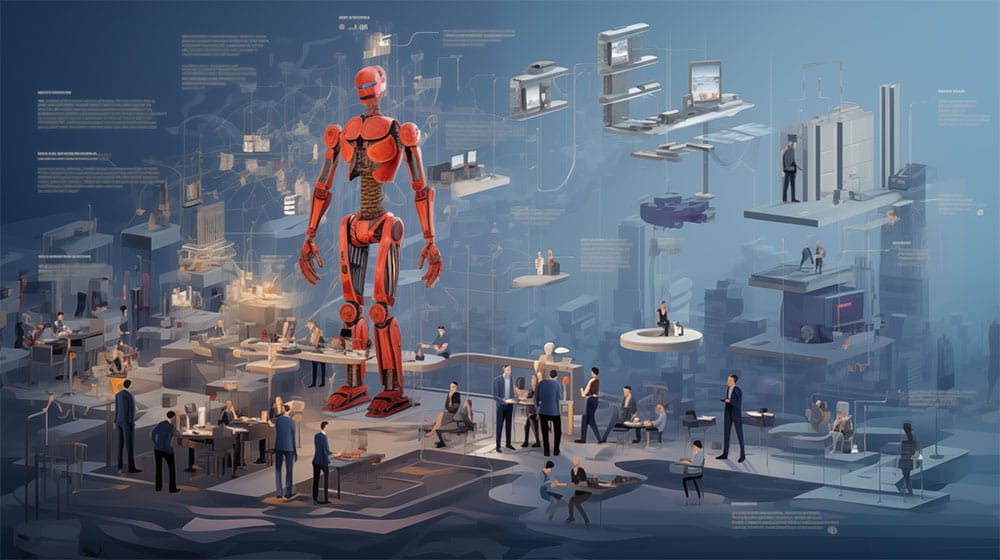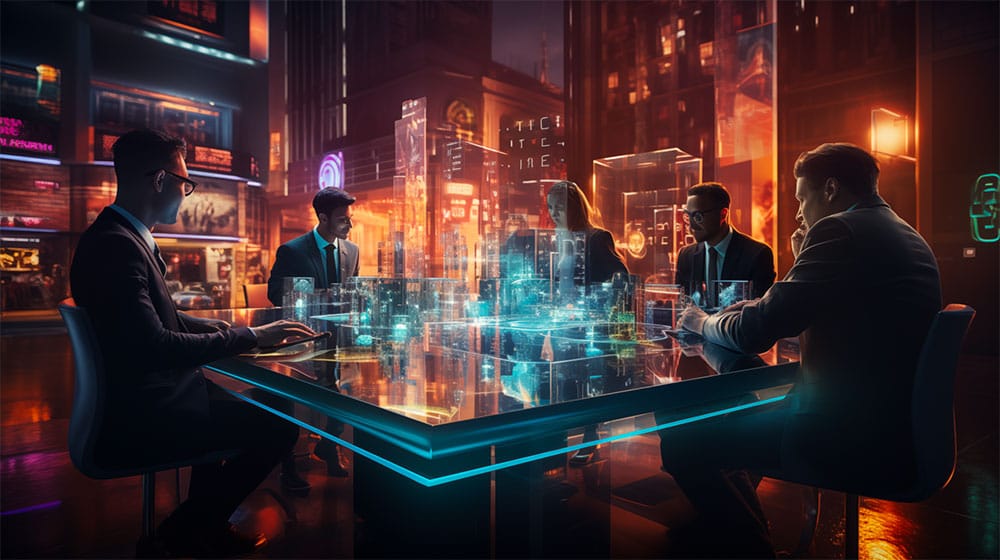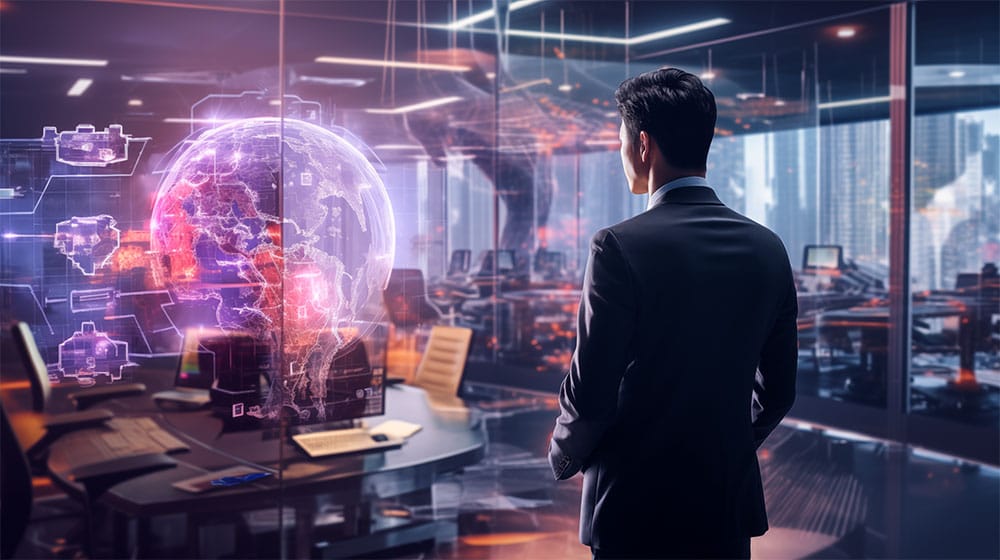The Coming Wave of AI Disruption: Navigating the Future in Large Enterprises

In the rapidly evolving landscape of artificial intelligence (AI), 2023 is a landmark year, marking significant advancements and transformations in how enterprises operate and strategise. For the C-suite of large organisations, understanding and adapting to the wave of AI disruption is crucial for maintaining a competitive edge and ensuring sustainable growth.
2023: A Year of Transformative Change
This year has been pivotal in the AI sector, with developments surging past traditional boundaries. Unlike specific tech trends like Web 3 or the metaverse, AI's reach is vast and all-encompassing, impacting everyone from individual consumers to large enterprises.
The advancements in AI technology are about automating tasks and enhancing human capabilities in solving complex problems. This dual impact of AI has profound implications for the strategic direction of large enterprises, necessitating a re-evaluation of their business models, workforce strategies, and long-term goals.
The integration also presents unique challenges, such as aligning AI systems with evolving work practices, dealing with the inherent opacity of deep learning systems, and the lack of control organisations have on employees using any of the many new tools being launched daily.
While AI technologies, such as ChatGPT, offer enormous potential to enhance productivity and efficiency, they also raise concerns about job displacement, roles, and responsibilities. Jobs involving repetitive tasks are most susceptible to automation, although the mediocre knowledge worker is also at risk of being replaced.
Nevertheless, it's crucial to note that AI also creates new opportunities and roles, although it might take a while before we know what kind of new jobs will be created in the coming years. This dual impact necessitates a balanced approach to embracing AI in the workforce.
The Evolution of Work in the Age of AI

It is essential to understand that the implications of AI on jobs will not only affect monotonous jobs or knowledge work. Event work that for long has been deemed safe for being replaced by AI will be under threat.
This week, Tesla released an update on their Optimus Bot, which has significantly increased in capabilities and is rapidly approaching human capabilities. The newly unveiled Optimus Gen 2 is lighter, walks faster, has more sensors and a sleeker design.
It is easy to see how the Optimus Bot will affect future jobs, especially once it is hooked up with a multi-model Large Language Model. Fast forward a few years, and at the current speed of change, we will have affordable humanoids that can take over all kinds of work currently deemed safe for replacement/displacement.
Such rapid advancements underscore the need for a balanced approach to AI integration in the workplace, where the focus should not only be on efficiency and productivity gains but also on enhancing the quality of work and employee satisfaction.
The challenge for enterprises is to harness the benefits of AI while mitigating its adverse effects on employment. This requires a strategic approach that includes investing in employee training and development, redesigning job roles to incorporate AI, and fostering a culture of innovation and adaptability.
AI Beyond Control and Management

Compared to other technologies, AI is unique in its widespread, uncontrollable usage. It represents a paradigm shift in daily work routines and organisational structures, necessitating enterprise leaders' swift and strategic response. Whereas other technology trends such as blockchain or Virtual and Augmented Reality require careful planning and investments to implement within an enterprise organisation, artificial intelligence is widely accessible to any employee, if not via the company network, then via employees' own phone networks and smartphones.
At the same time, AI could also create a more balanced power dynamic, especially for individuals and groups with traditionally less power. These tools can be utilised without organisational oversight, democratising access and using powerful technologies. However, this also raises ethical concerns, as the widespread use of AI can lead to issues of privacy, data security, and potential misuse. Enterprises must, therefore, develop ethical guidelines and policies to govern the use of AI, ensuring responsible and fair practices.
As such, enterprises must recognise that AI is not just a technology to be managed but a transformative force reshaping the very fabric of business operations and strategies, which is difficult, if not impossible, to stop. Only those organisations that recognise this and embrace AI in all its facets while ensuring alignment with organisational values and objectives will survive in the medium to long term. After all, by 2030, there will be two types of organisations: those that embrace AI and those that do not exist.
The Next Wave: Impact on Knowledge Workers

The forthcoming wave of AI will profoundly impact knowledge workers. Consultancy firms and other knowledge-intensive sectors are now facing a new era where AI could take over significant aspects of their work. This presents both opportunities and challenges for knowledge workers. On the one hand, AI can enhance its capabilities, providing tools for data analysis, decision-making, and creative problem-solving, such as the recent launch of Lilli by McKinsey. On the other hand, it necessitates continuous learning and adaptation to new technologies and methods.
The ethical implications of AI and its impact on work, especially in decision-making processes, are critical. AI systems can perpetuate existing biases in historical data, leading to unfair and discriminatory outcomes, of which we have seen many examples already worldwide. Enterprises must address these concerns by ensuring transparency, fairness, and accountability in AI development, deployment, and use. Enterprises must invest in developing AI systems free from biases and ensure that the data used for training these systems is diverse and representative. Moreover, there should be continuous monitoring and auditing of AI systems to identify and rectify any biases. This commitment to ethical AI practices will prevent potential harm and build trust among employees and stakeholders.
The transformation of jobs due to AI necessitates a significant shift towards reskilling and lifelong learning. Enterprises play a crucial role in this transition by providing training and development opportunities that enable employees to acquire the new skills required in the AI-driven workplace. This investment in human capital is beneficial for the employees but also essential for the organisation's long-term success in a rapidly changing business environment.
Conclusion: Embracing AI Responsibly and Strategically

The wave of AI disruption necessitates a proactive and strategic approach from enterprise leaders. It's crucial to recognise that AI is not just a technology to be managed but a transformative force reshaping the very fabric of business operations and strategies. Leaders must balance the ethical implications and the bias to action, ensuring that the deployment of AI aligns with organisational values and societal norms.
As we navigate this uncharted territory, we should emphasise enhancing human capabilities rather than merely replacing human labour. The future will belong to those enterprises that can adeptly blend AI capabilities with human ingenuity, fostering a symbiotic relationship that propels technology and humanity forward.





